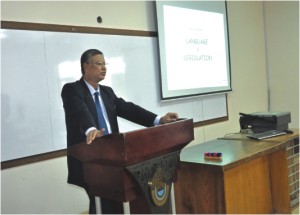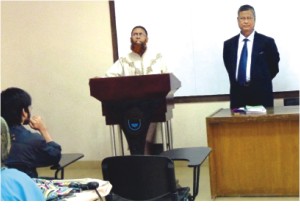Seminar
Discourse on Language and Legislation at NSU
Sadia Zahid
 |
Justice Dr Ziaul Karim as the guest speaker at the programme
|
 |
Prof Shahedul Huq, Head of IML at the lecture
|
THE Institute of Modern Languages at NSU organised its second IML Discourse I event on Language and Legislation on November 19. IML Discourse I is one of the most prestigious lecture series at NSU that encourages students to find new areas of research into fields that are deeply influenced by language. Justice Dr Syed Ziaul Karim was the guest speaker in this event. The discourse was attended by students of the Institute as well as students of English and business administration.
The discourse pointed out that language and legislation are closely related. The use of language is a very serious issue. In terms of law, expressions need to be exact to such a degree that judges and lawyers often use books while presenting their arguments and verdicts. A lawyer can only use the judicial language to represent his client's point of view. Bad language and expressions of offensive opinions of the lawyer and his client about race, ethnicity, the opposing lawyers and the judge etc are not only considered unprofessional, but are also seen as 'contempt of court' and can result in a sentence for both the client and the lawyer. In addition, every convict has the right to know the crime he is sentenced for. These issues reminded the audience of the Oxford philosopher and linguist John Austin who wrote extensively on speech acts, performative utterances, and felicity conditions that explained how legal verdicts are realised. Justice Dr Karim said that in an attempt to make the legislations more understandable for the laymen, the lawyers are now encouraged to use Bengali as much as possible.
It may be mentioned that the previous discourse on Language and Diplomacy in the series provided the topic 'Role of English in Bangladesh-India diplomatic negotiations' on which Mr Aftab Uddin Chowdhury of the English Department is working for his MA (Linguistics) thesis.
| 